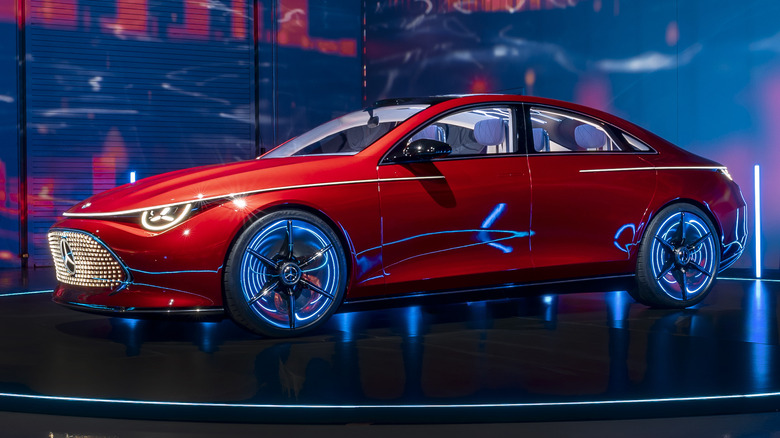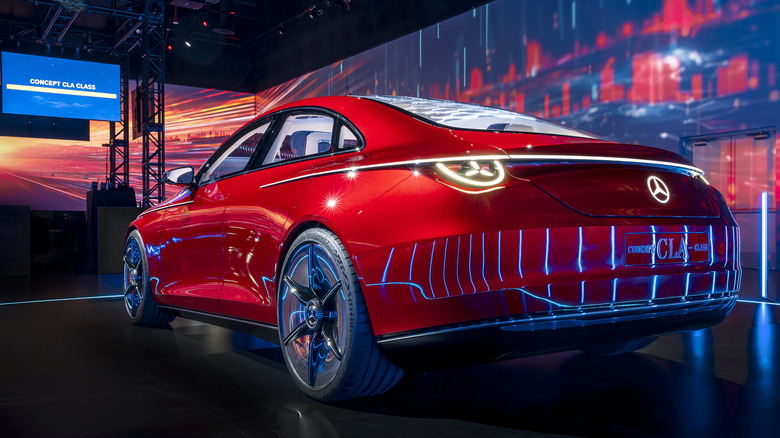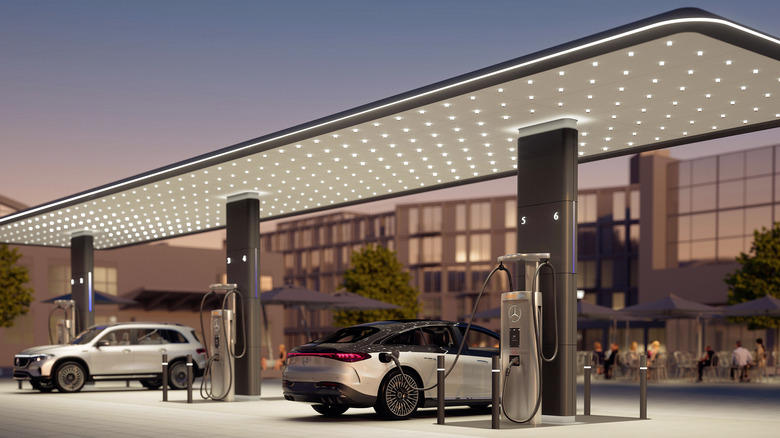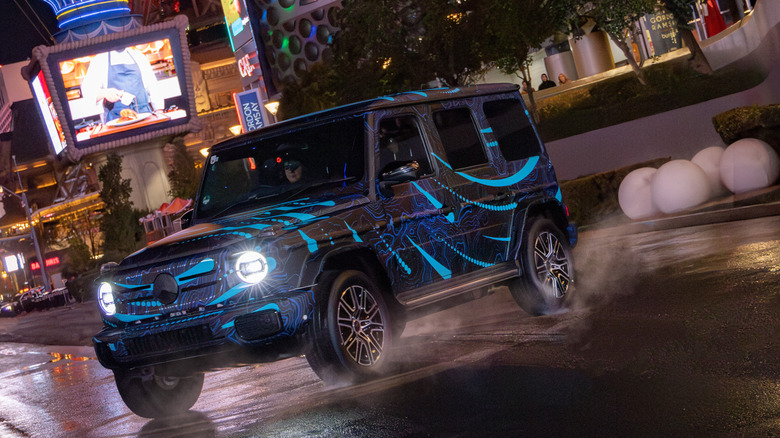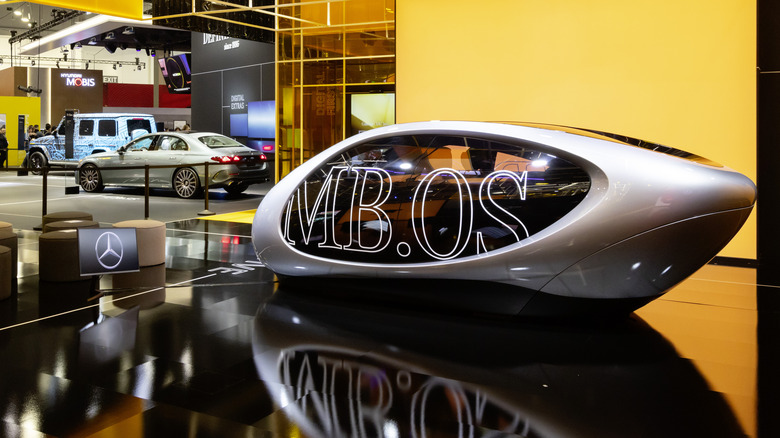Mercedes Brings A Solution For EV Drivers To CES 2024 (But There's Still A Big Problem)
Faster charging for electric cars may bring new drivers over from their internal combustion vehicles, Mercedes' top tech executive predicts, but those advances will still struggle against one of the most commonly cited reasons for not going electric. Although the German automaker already has a six-strong lineup of EVs in its U.S. portfolio, it's preparing the way for a far more affordable range of cars — and the potential concerns drivers may have about them.
In the near future, the first EVs using the new Mercedes-Benz Modular Architecture (MMA) will arrive: initially, a family of four electric cars and SUVs based on the Concept CLA Class. Despite Mercedes' positioning in the auto world, they'll actually be the most affordable models it offers, a gateway into ownership that also comes with the automaker's most cutting-edge EV technology.
In a roundtable with Markus Schäfer, Member of the Board of Management of Mercedes-Benz Group AG and Chief Technology Officer for the automaker, at CES 2024 this week — where Mercedes hosted SlashGear — the exec was blunt about the challenges electric vehicles face to grow adoption, particularly in urban areas. Schäfer also proved pessimistic about just how quickly one of the biggest headaches EV owners still experience might be solved.
MMA promises more range and lower EV cost
The CLA Class promises to be a game-changer for Mercedes. Four vehicles are planned initially — a sedan, a "sporty shooting brake" (aka what Americans would most likely call a wagon), and two SUVs — on the brand new, electric-first MMA platform. That will debut Mercedes' first in-house electric motor design, which Schäfer says borrows advances from the Vision EQXX concept we drove last year to be particularly efficient on the road.
The hurdles to adopting electric vehicles aren't just centered on EV pricing, of course. For potential drivers in urban areas, where private garages and assigned parking spaces are the exception rather than the norm, having a place to consistently charge an EV is a genuine headache. That often compounds the perennial range anxiety concern, where drivers worry that their electric car just won't have the capability to drive as much as they'll need to.
Unlike many automaker execs, however, Schäfer isn't convinced that faster charging is the fix to all these concerns. Or, indeed, that EVs that charge faster will automatically make smaller batteries more mainstream.
It's like a gas station, but with no gas
Ironically, Schäfer says EVs could do worse than borrowing from the gas station model, despite not having to drive to the pump being a common advantage cited for electric vehicles. "The simple answer is that is how we got involved in DC high power charging," the Mercedes CTO explained when asked about the challenges of urban EV adoption. "That's why we're going to what we're seeing in MMA. So, you charge with 300 kW or more, in the car: you go to a charger in a neighborhood, like a gas station, near home, and charge your car in six minutes or eight minutes. So you don't necessarily have to charge at home, if you don't have it."
For that to work, of course, drivers need not only cars that charge swiftly but a charging network that can be relied upon. There, Schäfer is actually a little more optimistic than many.
"The solution we see is fast charging with high power, fast chargers," he said. "We expect this is going to happen pretty soon. So from the charging side, this is going to be available, and then the car has to be able to take that." Mercedes itself is just at the start of the rollout of its own EV charging network.
Get ready for 500+ kW DC fast chargers
Currently, Mercedes' EVs (like the EQS SUV and EQE Sedan) support 400V, not 800V. Indeed, at CES in previous years, executives at the automaker have insisted that the absence of that higher-power architecture hasn't been a drawback for its electric models. This year, though — and with the first MMA-based vehicles fast approaching — Schäfer is talking a slightly different story.
"The shift to 800V cars and, associated with that, chargers that offer 300, 350, or even 500 kW, this will happen immediately," Schäfer predicts. "Tesla is moving there: In the Cybertruck they're moving in the world of 800V. Hyundai is moving there ... If you look in the world, things are clearly moving there."
With very fast DC charging support on both the vehicle side and the infrastructure side, it might also follow that concerns about EV range would also be squashed. That's certainly the strategy many in the industry hope will pan out, given that the battery pack is the single most expensive element of an electric vehicle. Unfortunately, Schäfer isn't convinced, at least not for the moment.
Faster charging won't kill range anxiety
"If you could charge in 8-10 minutes, would you buy a car with 200 km [124 miles] of range?" the CTO posed, theoretically. "There's still this range anxiety out there, and to be honest, even if this was available — theoretically — I'm not sure customers wouldn't want more battery in the car."
Like all automakers have discovered — often with expensive results — the challenge is that expectations among consumers don't line up with reality. That's particularly the case when it comes to just how often they'll need to make a country-spanning road trip, and they often base their purchase decisions on those rarities. "It's not rational, the customer is not rational, Schäfer said. "People think about just one trip to the Alps, a ski trip."
While eventually that tide may turn, the Mercedes CTO doesn't see that happening any time soon. "I think we'll still see range anxiety, and the demand for higher ranges, for some time," he concluded.
